Sleeve High Neck Bodycon Dress
$132.00
Lorem ipsum dolor sit amet, consectetur adipiscing elit. Nam fringilla augue nec est tristique auctor. Donec non est at libero.

Lots of cards equate to lots of rules. That's why we've included all the rule details in a categorized "by the cards" approach below. Simply click on the category of card you have a question about, and find the answer. If you're stumped on a rule we haven't described, please contact us with your question(s).


Use to say no to opposing action cards played against you. Two denied cards cannot be played on top of one another.



Force any opponent to trade their hand for your hand.

Point to one of your opponent’s cards and force them to exchange that card for one card in your hand. You choose the card from your hand you want to swap.



Player takes another turn. This card is always the second card played during the turn.

Reverse the order of the game play. If only two individuals are playing, the Reverse card acts as a "Play Again" and the player takes another turn.



Play to add to or complete any Bond set. Player must have one Bond card already played to use. If an opponent steals a Bond card, leaving just a Bond Action, the Bond Action immediately goes to the discard pile.

Trade any Bond card you have played for any Bond card an opponent has played. The Bond Trade may not be used to trade Bond Action cards. If your opponent is left with only a Bond Action card after the trade, that Bond Action card must be discarded.

Take any played Bond card from any opponent. Bond Steal cards may not be used to steal Bond Action cards. If an opponent is left with only a Bond Action card after the trade, that Bond Action card must be discarded.




Collect two Bond B cards to complete one set. Roll one die at the end of the game for each card in the set prior to tallying everyone’s money to see who wins. The bank will pay the player the total $ equivalent of the sum multiplied by 10K.





Collect three Bond A cards to complete one set. Players with one or more completed Bond A set(s) roll two dice at the end of the game to see how much money they will earn for each Bond A card, prior to tallying everyone’s money to see who wins. The bank will pay the player the total $ equivalent of the sum multiplied by 10K.


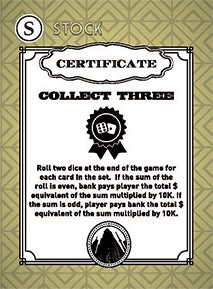
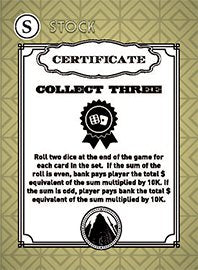
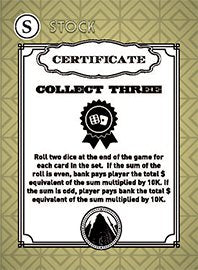
A player must have three stocks played to complete one set. Once a set is complete, additional stock cards drawn play into a new set. Stocks are risky. At the end of the game, all players with one or more completed stock sets, must roll two dice for each stock to determine how much the bank pays them, or, how much they pay the bank before all players do a final count of their of money to determine the winner. If the sum of the roll of both dice is even, the bank will pay that player the amount of the sum multiplied by 10,000. For example, a roll of two and six would equate to a gain of eighty thousand dollars. If the sum of the roll of both dice is odd, the player will pay the bank the amount of the sum multiplied by 10,000. For example, a roll of two and one would equate to a loss of thirty thousand dollars. Players do not roll on incomplete sets at the end of the game.


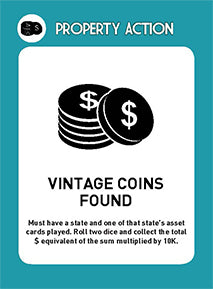
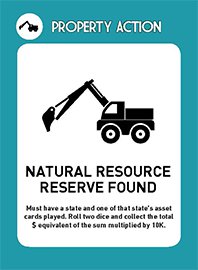
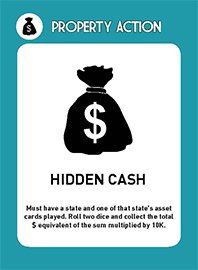
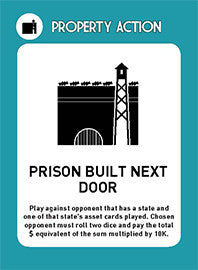
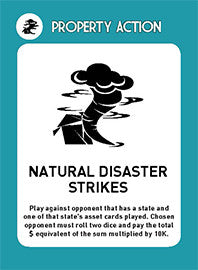
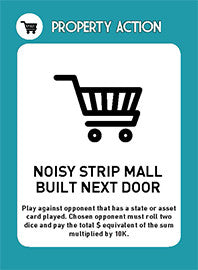


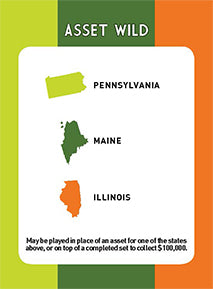
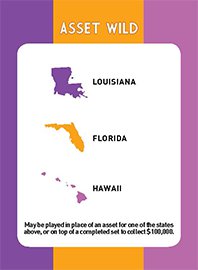
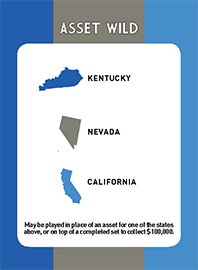
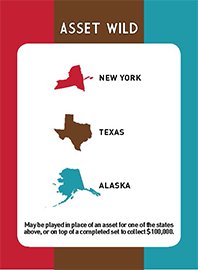
You must have one of the State cards listed on the Asset Wild card played, prior to playing the Asset Wild. Asset Wild cards may be played two ways.
1) You may play an Asset Wild in place of an Asset in order to expedite completing a set. If you draw the third Asset, it get’s placed in the set, no money is collected, and the Asset Wild card goes to the discard pile.
2) If you already have a completed set and draw the asset wild card that compliments that set, you can play it to the discard pile and collect $100,000.
Note: If you have the State card and Asset Wild card played, and your opponent steals the State card, the Asset wild card immediately goes to the discard pile.


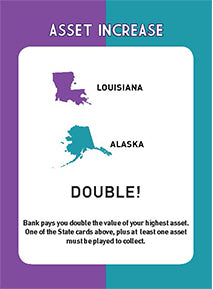
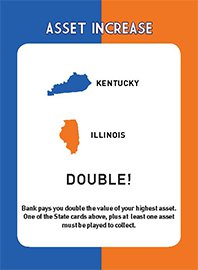
You must have one of the State and State Asset cards shown on the Asset Increase card played to collect on an Asset Increase.
When you choose to play this card, in goes to the discard pile, not your play area. When played, the bank pays you double the value of your highest asset in that set.


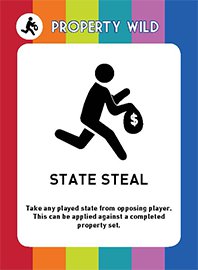
Take any state played from opposing player. This can be applied against a completed property set.

Force any opponent to trade one of their played states for one of your played states. This can be applied against a completed property set.


Offer opponent to trade one of your played assets for one of their played assets. Opponent can either accept, or pay the bank $250K and deny the asset negotiation.

Steal any completed property set from any opposing player. Cannot steal an incomplete property set.


Every State card has two Asset cards that build to make each Property set. The State card must be played before that State’s Asset cards in order to collect money for the Assets.
Asset cards may be played prior to laying down state cards, however, no money will be paid if the state card isn’t played first.
If an opposing player has a State card played, you cannot play the Asset card(s) that compliment that state.
Players can play State and Asset cards to the discard pile. However, if any card that is not a State or Asset is also going to be played to the discard pile in the same turn, it must be done prior to discarding a State or Asset.
State and Asset cards may be picked up from the discard pile as a draw. These are the only cards that can be picked up from the discard pile by opposing players. Once another player discards over a State or Asset card, that card may no longer be picked up.
If someone plays (not discards) an asset card not noticing that an opponent has already played that Asset’s State card, any player that says “Portfolio” first, receives that Asset, collects the money, and it goes to that person’s play area.
